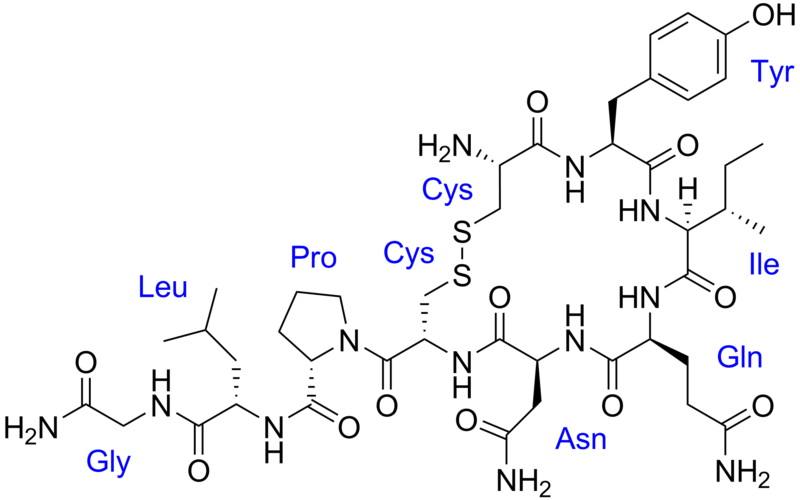Oxytocin’s major physiological role is to facilitate uterine contractions during birth. This is made through a positive feedback mechanism during the second and third stages of labor. Another important function is to mediate milk letdown. OXT initiates milk letdown in the mammary glands, and the release of OXT is stimulated by sucking.
Oxytocin also seems to play a role in social behaviors. The behavioral roles of OXT have been studied and characterized in several animal species and these findings have recently stimulated related works in humans. Is there any evidence about it?
OXYTOCIN 
Oxytocin (OXT) is a nonapeptide hormone that has vital physiological and behavioral actions.
OXT is synthesized as an inactive precursor ( preproprotein ) in the magnocellular neurons of supraoptic and paraventricular nuclei of anterior hypothalamus along with its carrier protein neurophysin I. Together with neurophysin, it is packaged into neurosecretory vesicles (Herring's bodies) and transported axonally to the nerve endings in the neurohypophysis, where it is either stored or secreted into the bloodstream. The last hydrolysis that releases the active OT nonapeptide is catalyzed by peptidylglycine alpha-amidating monooxygenase . The activity of the PAM enzyme system is dependent upon ascorbate, which is a necessary vitamin cofactor.
Transport in the bloodstream.
Its receptors are found in numerous brain nuclei and peripheral tissues (mostlyexpressed in mammary glands, uterus, SNC).
30% of the hormone is carried by plasma proteins; its half life is 3-6 minutes. It is metabolised by hepatic oxytocinases.
Its excretion is renal and biliary.
 p=.
p=. 
LOOKING FOR CLINICAL TRIALS
Searching in PubMed MeSH terms Oxytocin and social behavior published from 2009 to 2014, 36 clinical trials on humans were found.
Some results of the studies
- Oxytocin seems associated with parenting style of fathers
A double-blind, placebo-controlled trial with intranasal oxytocin administration to fathers. Fathers with their typically developing toddler (n = 18), and fathers of toddlers diagnosed with ASD (n = 14), were observed in play sessions. In all fathers oxytocin elevated the quality of paternal sensitive play: fathers stimulated their child in a more optimal way, and they showed less hostility. This suggests the positive effects of oxytocin on paternal sensitive play irrespective of clinical status of their child.
Oxytocin enhances paternal sensitivity to a child with autism.2010
- Oxytocin seems involved in reducing eating and weight concerns patients with Anorexia Nervosa (AN)
A double-blind, placebo-controlled trial. 64 female subjects: 31 patients with AN and 33 control students were enrolled. Six weeks of oxytocin nasal spray reduced eating and weight concerns in a group of patients with Anorexia Nervosa during nutritional rehabilitation.
Intranasal oxytocin attenuates attentional bias for eating and fat shape stimuli in patients with anorexia nervosa.2014
- Intraindividual factors modulate the effect of intranasal oxytocin on the affective response to stress
100 undergraduate students (50 women) were enrolled. Among them self-administration of intranasal oxytocin reduced anxiety in response to the Yale Interpersonal Stressor (YIPS) relative to the placebo in women high in emotion-oriented coping [b = 4.487, t(91) = 2.09, p < .05], but not in women low in emotion-oriented coping, or men. The results suggest that intraindividual factors modulate the effect of intranasal oxytocin on the affective response to stress. Intranasal oxytocin appears to be particularly beneficial to women who endorse high levels of emotion-oriented coping, who may be vulnerable to the negative impact of stress.
Coping style moderates the effect of intranasal oxytocin on the mood response to interpersonal stress.2012
- The oxytocin is involved in modulating envy and gloating
Fifty-six participants participated in this double-blind, placebo-controlled study. Following the administration of oxytocin or a placebo, participants played a game of chance with another participant who either won more money, lost more money or won/lost equal amounts of money. In comparison with the placebo, oxytocin increased the envy ratings when the participant gained less money than another player. Oxytocin also increased the ratings of gloating when the participant gained more money than the other player. By contrast, oxytocin had no effect on the emotional ratings following equal monetary gains nor did it affect general mood ratings.
These results suggest that the oxytocinergic system is involved in modulating envy and gloating. Thus, contrary to the prevailing belief that this system is involved solely in positive prosocial behaviors, it probably plays a key role in a wider range of social emotion-related behaviors.
Intranasal administration of oxytocin increases envy and schadenfreude (gloating).2009
- Sex-specific effects of oxytocin
It is concluded that the gender-specific findings reported may point to some biosocial differences in the effect of OXT which may be expressed in women's tendency for communal and familial social behavior as opposed to men's tendency for competitive social behavior.
Oxytocin facilitates accurate perception of competition in men and kinship in women.2013
CONCLUSION
There are limitations in current human oxytocin clinical research.
At present no strong evidence suggests that self-administration of intranasal oxytocin may facilitate social interaction by attenuating the stress response to interpersonal conflict.
It seems that intraindividual factors and gender differences may play a role on the emotional response.
Oxytocin's potential therapeutic applications are still working hypothesis.